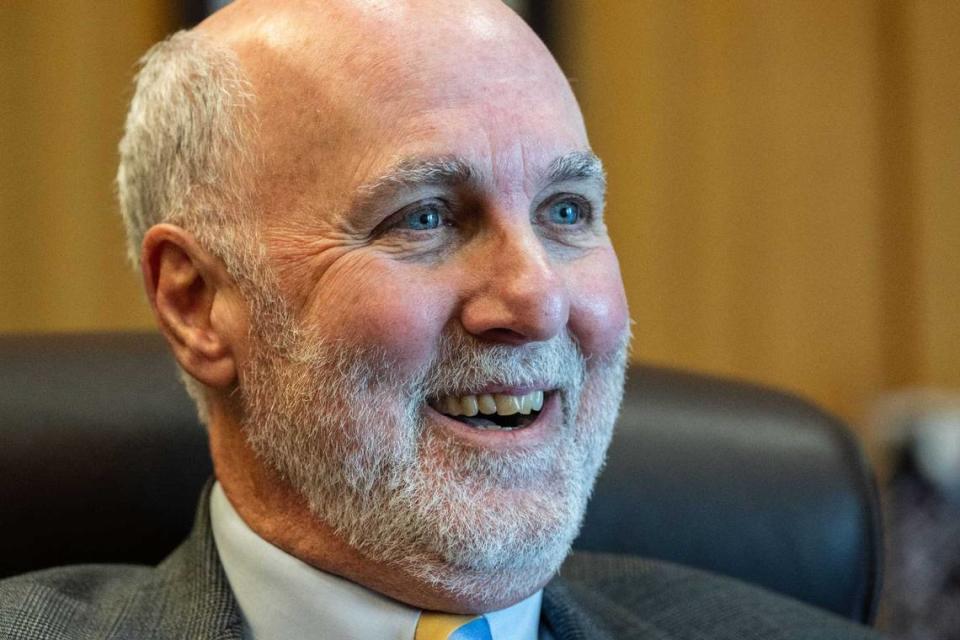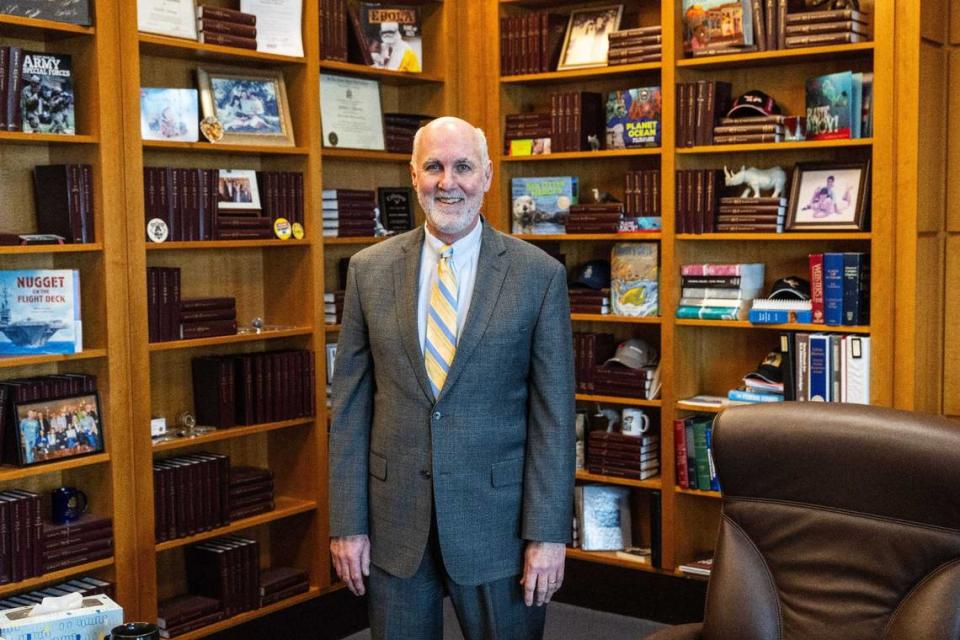Sacramento Judge Ken Newman to hear ‘all rise’ for last time as he leaves bench
- Oops!Something went wrong.Please try again later.
One of the most stressful duties a federal magistrate judge faces is deciding whether to allow a defendant to remain free pending trial or send them off to jail as their prosecution proceeds.
Chief U.S. Magistrate Judge Kendall J. Newman has seen the extremes, from allowing the release of a Chinese scientist accused of lying about her ties to China’s military to ordering the jailing of a con artist who promptly fainted in front of him.
“Some people say it’s the toughest job we have,” Chief U.S. Magistrate Judge Kendall J. Newman said in his chamber on the eighth floor of Sacramento’s federal courthouse. “Personally. I think if you have a confidence in your own ability, and especially if you’ve been doing it a while, you feel confident and comfortable in your decision the majority of the time.
“There are times you clench and say, ‘Oh, I hope I’m getting this one right.’”
Newman thinks he got most of those decisions right.

The Chinese scientist, who prosecutors warned would flee to her homeland if released, remained in the home of a stranger who volunteered to take her in and eventually saw the Justice Department drop its charges against her.
The con artist, would-be movie studio impresario Carissa Carpenter, lost repeated efforts to win release from custody and eventually was sentenced in 2018 to 6½ years in prison for defrauding investors of millions of dollars. (She won release from prison in October 2020 during the height of the COVID-19 pandemic).
“The flight numbers are remarkably low,” he said. “I mean, it’s less than 1% ...
“You’re not talking about someone who’s moving to countries without extradition. You know, if you’re dealing with someone who grew up in Stockton, if they flee, they’re going to flee to Modesto and we’re going to get them back.”
Newman, 65, is retiring Feb. 7 after 14 years as a magistrate judge and 15 before that as an assistant U.S. attorney in Sacramento, where he handled a series of groundbreaking cases ranging from a $102 million wildfire settlement — at the time the largest amount paid to resolve a wildfire lawsuit — to the complex and emotional negotiations that led to settlement terms over the Sacramento Police Department’s shooting of Stephon Clark.
Throughout his tenure, Newman gained a reputation for giving respect and leeway to both sides of a case.
“Chief Magistrate Judge Newman has been a fabulous, collegial member of our bench, and we will miss him greatly,” Chief U.S. District Judge Kimberly J. Mueller wrote in an email to The Sacramento Bee. “I remember first meeting Judge Newman when he was an Assistant U.S. Attorney, volunteering for the court by helping train up attorneys like me on how to conduct settlement conferences if we agreed to join the court’s early neutral evaluation panel.
“Little did either of us know then we would serve together — and he would put those settlement skills to such good use as a magistrate judge!”
Sacramento defense attorney Mark Reichel recalled having cases with Newman when Newman was a prosecutor, and said he “has always been considered an extremely smart lawyer.”
“He was very highly respected as a civil prosecutor, and when he went to the magistrate bench it was the same,” Reichel said. “He is without question one of the smartest attorneys I’ve ever seen. As a judge, he always made everyone feel respected, and that they had their day in court. He kept the courtroom very professional, yet easy and approachable.
“He wanted to hear everyone’s position before he ruled. He will be missed.”
Newman, who met his wife, Patricia, while they were students at Cornell University, moved to Southern California after receiving a law degree in 1984 from the Marshall-Wythe School of Law at the College of William & Mary.
“Fortunately, when I graduated was the boom years back in 1984, and there were on-campus interviews and one of them was Gibson, Dunn & Crutcher, and they flew me to San Diego, put me up at the Hotel del Coronado,” he said. “I had never been to San Diego.
“My wife and I — then my fiancée — we were going to look nationwide. That takes a lot of time. But we had heard good things about San Diego, so I went, they put me up in the Hotel del, and I thought to myself, ‘Mama, I’m home.’”
Newman practiced law in Southern California until 1990, when he became an assistant U.S. attorney and eventually moved to the Sacramento-based Eastern District of California in 1995, where he and a team of attorneys negotiated a $102 million settlement between the U.S. Forest Service and Union Pacific Railroad over damages to forest land by the 2000 Storrie Fire.
The settlement included payment for the loss of scenery and recreation use of the public lands, damages for what Newman termed “the intrinsic value of forests.”
“It’s not just logging rights because you’re not planning to log it,” he said. “But it’s valuable as a habitat and for ecotourism and all those other reasons. ... It was groundbreaking in that regard.”
As a prosecutor, Newman also oversaw a $5 million settlement with Rite Aid Corp. that led the company to securing its pseudoephedrine and ephedrine tablets and linking stores electronically to track sales of the drug to prevent methamphetamine manufacturers from going store to store to purchase the tablets.
“My wife still hasn’t forgiven me that I’m the one who settled with Rite Aid and moved all the ephedrine behind the counter,” Newman said. “It was called ‘smurfing’ back then. People were just going in and emptying every store to make meth.”
The settlement led to “a nationwide network to prohibit people from just going down the block from one pharmacy to another,” he said.

Newman said he found he enjoyed the process of settlement negotiations, and found himself attracted to the idea of becoming a magistrate judge and handling settlement conferences between parties.
He applied for the post three times before winning the job, which functions as sort of a traffic cop handling arraignments, initial appearances and helping guide cases through the legal process before they end up before district judges. The magistrate judges are particularly important in the Eastern District, which stretches from the Oregon state line to Bakersfield and for years has one of the highest caseloads per judge in the nation.
Settlement negotiations in wrongful death and other lawsuits are among the most interesting part of the job, he said.
“There’s a lot of emotions,” he said. “I think I’ve developed a reputation as being a good client whisperer with the ability to talk to people, to relate to them.
“I can’t tell you how many people have told me over my career, ‘I can’t believe you’re a federal judge.’”
Newman oversaw the settlement negotiations between the city of Sacramento and family members of Stephon Clark, the unarmed Black man shot to death by police in 2018 in a case that drew national attention and led to massive protests that shut down freeways and blocked thousands of fans from entering the Golden 1 Center for Sacramento Kings games.
The case ultimately settled, with the city agreeing to pay $2.4 million to Clark’s two children and $1.7 million to his parents.
Settlement conferences typically were held in rooms at the courthouse until the pandemic began, when Zoom conferences began to be used and frequently still are.
“That’s worked remarkably well,” he said, “and so we continue to do many by Zoom. I leave it to the parties a lot. Does this one need to be in person? Do you want to have it by Zoom?”
Although Newman is leaving the courthouse, he is hardly retiring full-time. Instead, he says he will be doing work for Judicate West, a mediation and arbitration firm that will allow him to continue doing what he loves without being tied to a courtroom. His first mediation is set for two days after he leaves the bench.
“It was just the right time for me and the right opportunity,” he said.
But he concedes he will miss walking into his courtroom in his robe as spectators and lawyers are asked to rise from their seats.
“Oh, absolutely,” Newman said. “The ‘all rise’ and the whole thing.
“As a private mediator, you no longer have the authority of the robe, and you don’t get to yell at someone or threaten to sanction them. More than ever you’re having to work collegially with the parties.
“But I tend to do that anyway.”

